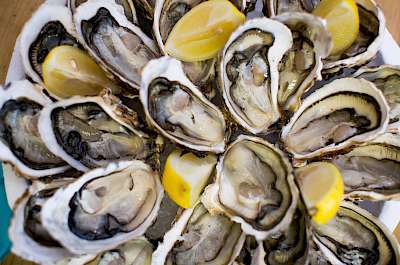Oyster: Calories and Nutrition Analyse
How many calories in oyster?

Nutrition Facts
OysterServing size:
medium size oyster (50 g) change
5g10g15g20g30g40g50g60g80g100g120g140g160g180g200g220g250g300g350g400g450g500g600g700g800g900g1000g
1oz2oz3oz4oz5oz6oz7oz8oz10oz12oz15oz20oz25oz30oz35oz40oz50oz
Amount Per Serving:
100g of oyster contain about 51 calories (kcal).
Calories per:
ounce
| one oyster
| cup sliced
To show you what does it mean, a medium size oyster (50 g) contain about 26 calories.
This is about 1% of the daily caloric intake for an average adult with medium weight and activity level (assuming a 2000 kcal daily intake).
Scroll down for details and nutrition tables.
To visualize how much 26 kcal actually is, keep in mind that the calorie content of oyster is similar to that of, for example:
- 0.5 apple
- 1 cube of sugar
Take a quick look at the tables below for detailed information about oyster nutrition.
100g of Oyster
Nutrition
- Calories51
- Carbs Total2.72 g
- Dietary fiber0 g
- Fat1.71 g
- Protein5.71 g
- Water89.04 g
Vitamins
- Vit A44 IU
- Vit B1 (Thiamine)0.018 mg
- Vit B2 (riboflavin)0.09 mg
- Vit B3 (Niacin)0.925 mg
- Vit B60.031 mg
- Vit B9 (Folic acid)0.007 mcg
- Vit E0.85 mg
- Vit K0.001 mg
Minerals
- Potassium156 mg
- Phosphorus1 mg
- Magnessium18 mg
- Calcium59 mg
- Sodium85 mg
- Iron4.61 mg
- Zink1 mg
Discover the Nutritional Treasure of Oysters
Oysters, those enigmatic jewels of the sea, have long been celebrated not just for their distinctive taste but also for their impressive nutritional profile. Whether you're a seafood aficionado or someone curious about incorporating more nutritious options into your diet, understanding the oyster nutrition facts can be quite enlightening.
Oyster Calories and Nutritional Breakdown
One of the most appealing aspects of oysters is their low-calorie count. With just 51 calories per 100 grams, they are a guilt-free addition to any diet. But don't let their low calorie content fool you; oysters are packed with a variety of essential nutrients.
- Protein in Oyster: At 5.71 grams per 100 grams, oysters are a fantastic source of high-quality protein, essential for muscle repair and growth.
- Fat in Oyster: Oysters contain 1.71 grams of fat, but it's the good kind, rich in omega-3 fatty acids, which are beneficial for heart health.
- Carbs in Oyster: With only 2.72 grams of carbohydrates and a negligible amount of sugar (0.62 grams), oysters are an excellent choice for those following a low-carb diet.
Vitamins and Minerals Galore
Oysters are not just about macronutrients; they are a treasure trove of vitamins and minerals. They are an excellent source of iron, providing 4.61 mg per 100 grams, which is vital for transporting oxygen in the blood. Oysters are also rich in zinc (1 mg), crucial for immune function, and vitamin B12 (0.925 mg), essential for nerve health and the production of DNA.
Moreover, oysters offer a good dose of calcium (59 mg), magnesium (18 mg), and potassium (156 mg), all of which are important for bone health, muscle function, and blood pressure regulation, respectively. Despite their small size, oysters pack a punch when it comes to vitamin E (0.85 mg) and vitamin C, antioxidants that help protect the body from damage by free radicals.
Oysters in a Healthy Diet
Incorporating oysters into your diet can be a delicious and nutritious way to enjoy seafood while reaping numerous health benefits. Whether raw, grilled, or added to a stew, oysters can enhance your meals with their unique flavor and texture. However, it's important to source them from reputable suppliers to avoid the risk of foodborne illnesses.
Given their impressive nutritional profile, including low oyster calories, high protein in oyster, and essential vitamins and minerals, oysters can play a significant role in a balanced and healthy diet. So next time you're contemplating a nutritious meal option, consider the humble oyster – a small package with a big nutritional punch.
How many calories are there in 1, 2, 3, or 5 servings of oyster?
- Medium size oyster (50 g)26 kcal
- Oyster cup sliced (86g)44 kcal
- Ounce (oz) of oyster14 kcal
- Half of medium size servings of oyster13 kcal
- Small size serving of oyster (40g)20.8 kcal
- Big size oyster (65g)33.8 kcal
- Two medium size servings of oyster52 kcal
- Three medium size servings of oyster78 kcal
- Four medium size servings of oyster104 kcal
- Five medium size servings of oyster130 kcal
Compare oyster:
oyster vs shrimp, oyster vs squid, oyster vs octopus, oyster vs caviar, see all compares of oyster.

Similar calories number have:
See also:
Read this:
- How many calories does polenta have?
- Calories in a half of Mahi Mahi
- Calories in whole Mahi Mahi
- Calories for one, two or more Mahi Mahi
- How many carbs (carbohydrates) in Kahlua?
- How much fat in samosa?
- How much protein in shrimp sushi roll?
- What is weight of shrimp salad?
- Jicama calories per ounce (oz)
- Beef sandwich calories per serving size



Add comment